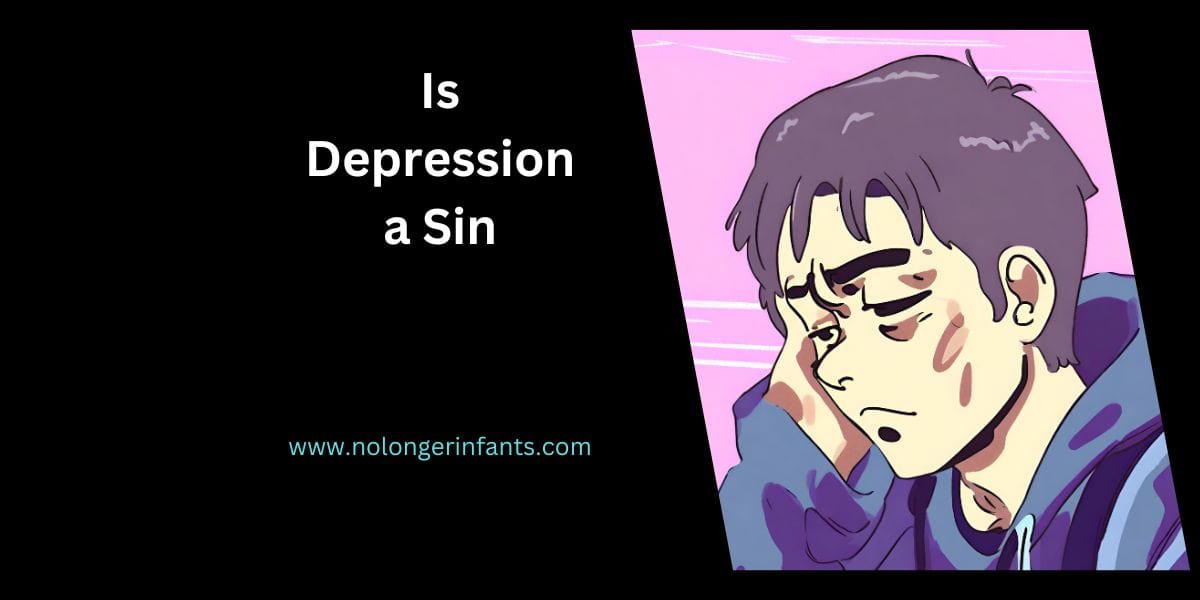Is Depression A Sin In The Bible
Whether Depression is a sin in the Bible weaves through intricate threads of theology and compassion.
As you ponder this complex subject, you may find yourself seeking clarity on how ancient scriptures address the modern struggles of mental health and you may wonder is Depression a Sin in the Bible?
Depression is not considered a sin in the Bible. It is a complex mental health issue that can affect anyone, including religious people.
The Bible acknowledges the reality of suffering and despair, and it offers comfort and reassurance.
Seeking help for depression aligns with biblical principles of acknowledging suffering and despair. Misconceptions about depression, such as it being a result of sin or a lack of faith, need to be addressed.
When you get depressed, it affects not only you but also your family members.
Sometimes, what we think is a spiritual problem is a medical problem. Depression can show in the emotional state of a person.
Once, I had a physical illness, and it led to me feeling sad. I didn’t want any social interactions. I just wanted to be left alone. I prayed for the power of God to touch me.
I remember my body not being able to sleep, and I was starting to lose it a bit.
I lost my appetite, and I had given up on life.
I felt like God had abandoned me, and there was no hope for me.
My Dad and Sister took me to the hospital to get checked out.
I went to a doctor who gave me medicine, and within a few weeks, I was able to get better, and my mood improved.
It was not a nice feeling.
Nearly one in six (15.6%) very religious American adults have been diagnosed with depression in their lifetime
Exploring this topic not only delves into religious interpretations but also challenges us to reflect on the nature of suffering and grace.
Key Takeaways
- Depression is not equated to sinfulness in the context of the Bible.
- Seeking help for Depression aligns with Biblical principles of acknowledging suffering and despair.
- Misconceptions among Christians about Depression, such as it being a result of sin or a lack of faith, need to be addressed.
- Biblical narratives and characters demonstrate struggles with Depression, emphasizing the importance of seeking support and solace in faith.
What is Depression

If you’re wondering what Depression is, it’s a severe mental health condition that affects how you feel, think, and handle daily activities.
According to Doctors, it can be a chemical imbalance as well.
Clinical Depression, a common form of this mental illness, goes beyond temporary feelings of sadness. A depressed person may experience persistent sadness, loss of interest in activities they once enjoyed, changes in appetite or sleep patterns, and feelings of worthlessness or guilt.
Despite the challenges of living with Depression, it’s essential to remember God’s promises and what the Bible says about finding hope and healing. The Bible acknowledges the reality of suffering and despair and offers comfort and reassurance.
It reminds us that we aren’t alone in our struggles and that God is with us, providing strength and guidance. By seeking support, turning to prayer, and reflecting on God’s Word, a person grappling with Depression can find solace in the enduring hope that faith brings.
Bible Verses About Depression
In times of Depression, turning to specific Bible verses can offer comfort and encouragement. The Bible provides verses that speak directly to the struggles individuals face with mental health issues, including Depression.
These verses can remind you of the truth of God’s love and presence in your life, helping you navigate through difficult times. Here are some Bible verses that can offer solace and hope during moments of Depression:
| Bible Verses | Reference |
|---|---|
| “The Lord is close to the brokenhearted and saves those crushed in spirit.” | Psalm 34:18 |
| “Cast all your anxiety on him because he cares for you.” | 1 Peter 5:7 |
| “Do not be anxious about anything, but in every situation, by prayer and petition, with thanksgiving, present your requests to God.” | Philippians 4:6 |
| “He heals the brokenhearted and binds up their wounds.” | Psalm 147:3 |
| “Come to me, all weary and burdened, and I will give you rest.” | Matthew 11:28 |
These verses remind you that God is with you in your struggles and that you can find peace and strength in Him during times of Depression.
Is Depression a sin in the Bible?

Depression isn’t considered a sin in the Bible. Understanding the nuanced perspective the Bible offers on this topic is essential. Here’s a breakdown to shed light on whether Depression is sinful in the Biblical context:
- Lack of Faith
- The Bible acknowledges that even the most faithful individuals may face doubt and despair.
- Doubting or struggling with faith doesn’t equate to sinfulness but reflects the human experience of wrestling with beliefs.
- Mental Disorders and Emotional Struggles
- Mental disorders and emotional struggles are recognized as part of living in a fallen world.
- These challenges aren’t indicative of sin but rather the complexities and brokenness of human existence.
- Spiritual Oppression
- While spiritual oppression can contribute to emotional distress, experiencing Depression isn’t inherently sinful.
- Seeking help and support is encouraged, as it aligns with Biblical principles of caring for oneself and others in need.
What are the causes of Depression
Various factors can contribute to the development of Depression. It’s important to understand that Depression can stem from a combination of different causes, ranging from medical conditions to mental health problems or even sinful acts as perceived in the New Testament.
Here is a breakdown of some common causes of Depression:
| Causes of Depression | Description | Example |
|---|---|---|
| Medical Condition | Underlying physical health issues can lead to Depression. | Chronic pain |
| Cause of Depression New Testament | Feelings of guilt or shame due to perceived sinful behaviour. | Betrayal |
| Sinful Acts | Engaging in immoral behaviours that conflict with personal values. | Addiction |
| Mental Health Problems | Conditions like anxiety disorders can contribute to Depression. | PTSD |
| Physical Cause | Imbalances in brain chemicals or hormones affecting mood. | Thyroid disorders |
Understanding these various causes can help in addressing and managing the complexities of Depression more effectively.
Popular Misconceptions Christians Have About Depression

Misconceptions among Christians about Depression often stem from a lack of understanding of the complex interplay of spiritual beliefs and mental health challenges. It’s crucial to address these misunderstandings to provide better support and care for those struggling with Depression.
- Depression is a result of sin: Some Christians mistakenly believe that Depression is always a direct result of sin in a person’s life, overlooking the many complex factors that can contribute to mental health issues.
- Prayer alone can cure Depression: While prayer can be a source of comfort and strength for individuals dealing with Depression, professional help and treatment are often necessary for managing the condition effectively.
- Having Depression means a lack of faith: This misconception implies that individuals with solid faith shouldn’t experience Depression, which can lead to feelings of guilt and shame among Christians facing mental health challenges.
How does the Bible address Depression?
How does the Bible offer guidance and support for individuals struggling with their mental health? The Bible acknowledges the reality of Depression and provides comfort and hope for those going through difficult times.
While some may mistakenly view Depression as a sin, the Bible doesn’t condemn those who are struggling with their mental health.
The Apostle Paul himself experienced deep emotional distress, as mentioned in 2 Corinthians 1:8-9, showing that even faithful followers of God can face moments of despair.
The Bible encourages individuals dealing with Depression to seek solace in prayer and to lean on their faith for strength.
Scriptures such as Psalm 34:17-18 remind us that God is close to the brokenhearted and saves those crushed in spirit. The Kingdom of God concept also offers a vision of a future where all pain and suffering will be eradicated, providing hope for a better tomorrow.
By turning to the teachings of the Bible and finding comfort in the promises of God, individuals can find support and healing in their battle against Depression.
How did Elijah engage with feelings of Depression?

Elijah, a prophet in the Bible, grappled with feelings of Depression during a challenging period in his life.
- Isolation and Exhaustion: Elijah experienced intense feelings of isolation and exhaustion after facing significant challenges and threats to his life. These emotions contributed to his sense of despair and desolation.
- Seeking Solitude: In his moments of deep despair, Elijah sought Solitude and withdrew to the wilderness. This act of retreat allowed him to reflect on his feelings and find solace away from the pressures of his circumstances.
- Divine Intervention: Despite his overwhelming emotions, Elijah engaged with his feelings of Depression by seeking divine intervention through prayer. He cried out to God, expressing his inner turmoil and seeking guidance and strength to overcome his struggles.
Through Elijah’s story in the Bible, we see a depiction of a revered figure engaging with feelings of Depression through introspection, seeking Solitude, and turning to higher powers for support and comfort.
How did God engage with feelings of Depression?
During moments of Depression, God offers comfort and solace to those who seek His presence. In the Bible, there are numerous instances where God engages with individuals experiencing feelings of Depression.
One prominent example is the book of Psalms, where King David openly expresses his struggles with despair and sorrow. Through heartfelt prayers and supplications, David finds solace in God’s presence, acknowledging that God is a refuge in times of trouble.
Additionally, the story of Job illustrates how God engages with feelings of Depression. Despite immense suffering and loss, Job maintains his faith and eventually experiences God’s restoration and blessings.
Through these narratives, the Bible portrays God as compassionate and understanding towards those struggling with Depression.
How did Jesus handle feelings of Depression?

In moments of emotional distress, Jesus exemplified resilience and sought solace through prayer and connection with his disciples.
When facing feelings of Depression, Jesus’s actions provide insights that can guide individuals struggling with similar emotions. Here’s how Jesus Christ handled feelings of Depression:
- Seeking Solitude: Jesus often withdrew to solitary places to pray, showing the importance of self-reflection and seeking a spiritual connection in times of distress.
- Expressing Emotions: Christ Jesus openly displayed his emotions, such as weeping at the death of Lazarus, illustrating the significance of acknowledging and processing feelings rather than suppressing them.
- Community Support: Jesus surrounded himself with close companions, like his disciples, emphasizing the value of seeking support from trusted individuals during emotional turmoil.
Examples of Depression in the Bible
Depression is vividly depicted in the Bible through the experiences of various individuals, shedding light on the complexities of mental health struggles.
The stories of the Bible reveal instances of Depression that many can relate to. For example, King David experienced deep despair when he cried out in the Psalms, feeling abandoned and overwhelmed.
Another example is when Elijah, after defeating the prophets of Baal, fell into a state of situational Depression, longing to die despite his previous victories.
As a depressed Christian, you can find solace in knowing that even prominent figures in the Bible faced similar struggles.
Consider King David, who expressed his anguish through Psalms, or Elijah, who experienced burnout despite his faithfulness. These stories serve as reminders that it’s okay to seek help and that faith can coexist with mental health challenges.
Just like King David found comfort despite his broken spirit, you, too, can find hope and healing amid your struggles.
Frequently Asked Questions
Can Depression Be Considered a Form of Spiritual Weakness or Lack of Faith?
Feeling depressed doesn’t equate to spiritual weakness or lack of faith. It’s a complex mental health issue that many struggle with. Seeking support and understanding is vital. Your mental health struggles don’t define your worth.
Is Seeking Professional Help for Depression Contradictory to Relying on God for Healing?
Seeking professional help for Depression isn’t contradictory to relying on God for healing. Both avenues can work hand in hand to support your well-being. It’s about using the resources available to you for holistic care.
Are There Specific Prayers or Rituals Recommended in the Bible for Those Struggling With Depression?
When battling Depression, turn to Psalms for comfort and prayers. Seek solace in God’s promises and find strength in His presence. Embrace faith, practice gratitude, and let His light guide you through the darkness.
How Can the Christian Community Effectively Support Individuals Dealing With Depression?
To support individuals dealing with Depression, offer a listening ear, show compassion, and avoid judgment. Encourage professional help, provide resources, check in regularly, and create a safe space for open conversations. Christian communities can make a difference.
Is There a Difference Between Feeling Sad or Discouraged and Experiencing Clinical Depression in the Eyes of Christianity?
Feeling sad or discouraged may differ from clinical Depression in Christianity. Recognizing the distinction can lead to better understanding and support for individuals struggling with mental health challenges. Offer empathy, love, and resources without judgment.
Conclusion
In conclusion, if you are wondering Is Depression a sin in the Bible please note that Depression isn’t a sin in the Bible. It’s a mental health condition that many people struggle with. The Bible offers comfort, guidance, and examples of individuals who also faced feelings of Depression.
Christians need to understand and support those who are experiencing Depression rather than judgment or condemnation. Remember, God is compassionate, loving, and there to help us through our struggles.
If you are suffering from intense feelings of sadness, suicidal thoughts, etc, you should get professional help.







Such a good post! I had a period with depression and anxiety and watched some biblical teaching about this – felt a failure and that I was sinning for exactly the reasons you mentioned. Couldn’t understand nothing was changing and turned out I needed HRT!! Yup, medical stuff causes depression, easy fix, but it wouldn’t have got better if I had listened to the teaching and not have gone to my GP!!
Yes such a good revelation. Glad you got
Fixed as I did.